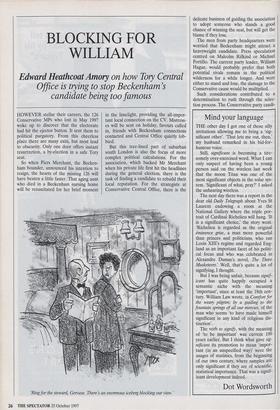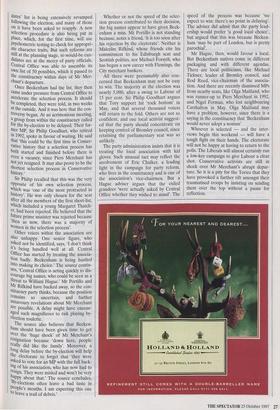BLOCKING FOR WILLIAM
Edward Heathcoat Amory on how Tory Central
Office is trying to stop Beckenham's candidate being too famous
HOWEVER stellar their careers, the 126 Conservative MPs who lost in May 1997 woke up to discover that the electorate had hit the ejector button. It sent them to political purgatory. From this cheerless place there are many exits, but most lead to obscurity. Only one door offers instant resurrection, a by-election in a safe Tory seat.
So when Piers Merchant, the Becken- ham bounder, announced his intention to resign, the hearts of the missing 126 will have beaten a little faster. That aging aunt who died in a Beckenham nursing home will be resuscitated for her brief moment in the limelight, providing the all-impor- tant local connection on the CV. Mistress- es will be sent on holiday, favours called in, friends with Beckenham connections contacted and Central Office quietly lob- bied.
But this tree-lined part of suburban south London is also the focus of more complex political calculations. For the association, which backed Mr Merchant when his private life first hit the headlines during the general election, there is the task of finding a candidate to rebuild their local reputation. For the strategists at Conservative Central Office, there is the Ring for the steward, Gervase. There's an enormous iceberg blocking our view.' delicate business of guiding the association to adopt someone who stands a good chance of winning the seat, but will get the blame if they lose.
The men from party headquarters were worried that Beckenham might attract a heavyweight candidate. Press speculation centred on Malcolm Rifkind or Michael Portillo. The current party leader, William Hague, would probably prefer that both potential rivals remain in the political wilderness for a while longer. And were either to stand and lose, the damage to the Conservative cause would be multiplied.
Such considerations contributed to a determination to rush through the selec- tion process. The Conservative party candi- dates' list is being extensively revamped following the election, and many of those on it have been asked to reapply. A new selection procedure is also being put in place, which, for the first time, will use psychometric testing to check for appropri- ate character traits. But such reforms are still at the planning stage, so would-be can- didates are at the mercy of party officials. Central Office was able to assemble its own list of 50 possibles, which it passed to the constituency within days of Mr Mer- chant's departure. Once Beckenham had the list, they then came under pressure from Central Office to accelerate the selection process. It should be completed, they were told, in two weeks at the outside. And it was here that the con- troversy began. At an acrimonious meeting, a group from within the constituency called for the by-election to be delayed. Their for- mer MP, Sir Philip Goodhart, who retired in 1992, spoke in favour of waiting. He said that 'this could be the first time in Conser- vative history that a selection process has both started and finished before there is even a vacancy, since Piers Merchant has not yet resigned. It may also prove to be the shortest selection process in Conservative history.'
Sir Philip recalled that this was the very opposite of his own selection process, which was 'one of the most protracted in history'. He was only chosen for the seat after all the members of the first short-list, which included a young Margaret Thatch- er, had been rejected. He believed that the future prime minister was rejected because `then as now, there was a majority of Women in the selection process'. Other voices within the association are also unhappy. One senior figure, who asked not be identified, says, 'I don't think it's being handled well at all. Central Office has started by treating the associa- tion badly. Beckenham is being hustled into making its choice.' The source contin- ues, 'Central Office is acting quickly to dis- courage big names, who could be seen as a threat to William Hague.' Mr Portillo and Mr Rifkind have backed away, so the con- stituency party thinks, because the position remains so uncertain, and further unsavoury revelations about Mr Merchant are possible. A delay might have encour- aged such magnificoes to risk playing by- election roulette.
The source also believes that Becken- ham should have been given time to get over the 'huge shock' of Mr Merchant's resignation because 'down here, people really did like the family'. Moreover, a long delay before the by-election will help the electorate to forget that 'they were asked to vote for an MP with the full back- ing of his association, who has now had to happy about They were misled and won't be very li,,aPpy about that.' The source concludes, ‘"‘Yelections often leave a bad taste in People's mouths. 1 am expecting this one to leave a trail of debris.' Whether or not the speed of the selec- tion process contributed to their decision, the big names appear to have given Beck- enham a miss. Mr Portillo is not standing because, notes a friend, 'it is too soon after his rejection by the electorate'. Neither is Malcolm Rifkind, whose friends cite his commitment to his Edinburgh seat and Scottish politics, nor Michael Forsyth, who has begun a new career with Flemings, the City merchant bankers.
All three were presumably also con- cerned that Beckenham may not be easy to win. The majority at the election was nearly 5,000, after a swing to Labour of 15 per cent. Sir Philip Goodhart argues that Tory support hit 'rock bottom' in May, and that several thousand voters will return to the fold. Others are not so confident, and one local activist suggest- ed that the party should concentrate on keeping control of Bromley council, since retaining the parliamentary seat was so unlikely.
The party administration insists that it is treating the local association with kid gloves. Such unusual tact may reflect the involvement of Eric Chalker, a leading light in the campaign for party reform, who lives in the constituency and is one of the association's vice-chairmen. But a Hague adviser argues that the exiled grandees 'were actually asked by Central Office whether they wished to stand'. The speed of the process was because 'we expect to win; there's no point in delaying'. The adviser did admit that the party lead- ership would prefer 'a good local choice', but argued that this was because Becken- ham 'may be part of London, but is pretty parochial'.
Mr Hague, then, would favour a local. But Beckenham natives come in different packaging and with different agendas. There are local politicians, like Michael Tickner, leader of Bromley council, and Rod Reed, vice-chairman of the associa- tion. And there are recently dismissed MPs from nearby seats, like Olga Maitland, who was runner-up to Piers Merchant in 1992, and Nigel Forman, who lost neighbouring Carshalton in May. Olga Maitland may have a problem, however, since there is a saying in the constituency that 'Beckenham would never adopt a woman'.
Whoever is selected — and the inter- views begin this weekend — will have a tough fight on their hands. The electorate will not be happy at having to return to the polls. The Liberals will almost certainly run a low-key campaign to give Labour a clear shot. Conservative activists are still in shock over Mr Merchant's abrupt depar- ture. So it is a pity for the Tories that they have provoked a further rift amongst their traumatised troops by insisting on sending them over the top without a pause for reflection.



















































































 Previous page
Previous page